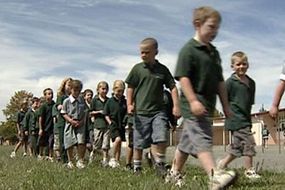School lessons a key to fight obesity

School programs which include lessons on nutrition and food preparation for school students could be the key to curb Australia's high obesity rate, dietitians have been told.
Reports have shown that one in four Australian children are overweight and one in 20 are obese.
At the Dietitians Association of Australia annual conference in Melbourne on Sunday, Dr Craig Johnston, an instrutor at the Children's Nutrition Research Centre, based at Baylor College of Medicine said that obesity is inceasing at an alarming rate, both in the United States and Australia.
Dr Johnston, who has been running courses for teens in Texas for six years, says few children are taught to read food labels or prepare meals.
He said that children see meals go into a microwave and then serve on the table but they have no clue as to what has gone into them.
About 600 children in four schools in Houston spent 45 minutes a day for six months studying nutrition and meal preparation. A study of 60 participants showed that after one year about 80 per cent weighed less than they did when the program started. After two years, 62 per cent still weighed less.
''We really are heading toward a pandemic and there are not a lot of programs which have been proven to work. You can get kids intensive intervention and watch over them while they lose weight but, once they leave [the program], the world takes over and there are a lot of things in society that promote us to be overweight or obese.''
''We also found once kids have the knowledge and get positive reinforcement for doing these things, they love it. Some of them couldn't tell one vegetable from another because they just weren't seeing these things at home but once they attended the classes, their knowledge improved dramatically.''
Dr Alan Barclay, who is at the conference said that while sugar had been blamed for America's expanding waistlines, the same could not be said locally. His research examined the relationship between fructose (a type of sugar) consumption and rates of overweight and obesity in Australia since the early 1970s. It found consumption of fructose has decreased by almost 20 per cent since the early 1970s, while overweight and obesity has doubled.
Some research has suggested fructose promotes fat production in the body, while other studies report it tricks people into thinking they are hungrier than they are. Dr Barclay said many of these studies have only been done in animals, fed very large amounts of fructose - far more than the average Australian would typically consume.
''Sixty-two per cent or more than 13 million Australian adults are overweight or obese,'' he said. ''One in four children carry too much weight for their height, which is working their hearts and organs way too hard.''





















